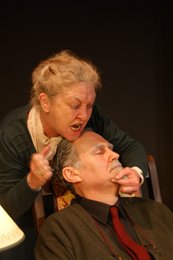Bernard Field’s earlier plays, The Early Hours (2010) and Last Train from Holyhead (2009), are tours de force of psychological realism that raise challenging questions. The Dublin-born dramatist endeavours to continue this work by adding to his latest play Zeitgeist another layer of authenticity, incorporating historical documentation with fictive drama. Zeitgeist intensifies the already striking details of an actual interview with a doctor who had worked at Auschwitz-Birkenau. Originally published in Der Spiegel, the English translation (which Field uses as his source) appeared in the Guardian newspaper in 1998.
Field retains verbatim descriptions of the doctor’s attitudes and duties at Auschwitz. He builds around the transcript a story of vengeance, circular in structure. In doing so, he succeeds in offering intricate characterisations of the interviewee, Ludwig Schultz, and his wife, Frieda. Fiona Kelly and Hugh Kirwan skilfully progress from an elderly couple engaged in mundane, domestic routines to a wife who seeks to repress  painful experiences, and who is suppressed by the will of her husband - a forcefully proud nature-enthusiast. Kirwan and Kelly were equally impressive in their roles. Anna Shaughnessy’s hair and make-up was effective in ageing the actors, while Iris Merz created a detailed, naturalistic set that helped to portray Ludwig as a cultured and well-read scientist. Immersed in the Schultz home, the journalist (played by Field himself) moves from bemusement to horror, culminating in the rage on which the plot hinges. However, as the journalist, Field fell short of his potential; he struggled with a German accent that could have been omitted altogether.
painful experiences, and who is suppressed by the will of her husband - a forcefully proud nature-enthusiast. Kirwan and Kelly were equally impressive in their roles. Anna Shaughnessy’s hair and make-up was effective in ageing the actors, while Iris Merz created a detailed, naturalistic set that helped to portray Ludwig as a cultured and well-read scientist. Immersed in the Schultz home, the journalist (played by Field himself) moves from bemusement to horror, culminating in the rage on which the plot hinges. However, as the journalist, Field fell short of his potential; he struggled with a German accent that could have been omitted altogether.
The interactions between the trio reveal that people can and do change, eliciting love, praise, respect, fear, condemnation, shame and repulsion variously throughout their lives. Ludwig collects butterflies, and the image of the butterfly emblazoned on the production’s promotional material lies at the centre of the play as a symbol for metamorphosis; this symbolism is pertinent to Zeitgeist’s central issues, such as the intersections of fiction and history, and how destruction can lead to enlightenment. As we learn more about Ludwig, we are reminded of the ways in which humans - like other species - adapt to changing environments in order to progress.
The writing deals with dichotomies in complex and thought-provoking ways, blending violence and restraint, hate and love, the political and the personal. It poses questions of how different scenarios can affect moral decisions, and asks to what extent we can shrug responsibility or ascribe culpability when we take context into consideration. Should we account for the historical moment and cultural conditioning, adopting liberal attitudes that seek to understand those who may have aided extreme right-wing regimes? Or - at the other end of the spectrum - condemn them, seeking vengeance, by ultimately subscribing to a right-wing dyad of good versus evil? Field courageously interrogates highly sensitive issues. He succeeds in complicating assumptions about crime, evil, humanity and nature, without eliding the monstrous atrocities of the Holocaust. This task is both brave and difficult, and Field’s script rises to the challenge.
.jpg.aspx%3Fwidth=260&height=173) The highlights of Visser’s direction included using props, silence and movement to further a sense of unease. Social etiquettes of offering and accepting refreshments such as schnapps and cake became, during tenser instances, combative exchanges.The most visceral moment in the performance occurred when Kirwan subjected the audience to the prolonged, analytical inspection of Ludwig Schulz. Here, Visser made productive use of the confined space to promote a palpable apprehension. This largely naturalist production would have benefited from capitalising more frequently on the intimacy of the venue to jolt the audience out of passivity and to stimulate such pertinent anxiety. More moments like the above, which successfully harnessed the liveness of performance to intensify the play’s meanings, would have moved the work in fresher, more exciting directions.
The highlights of Visser’s direction included using props, silence and movement to further a sense of unease. Social etiquettes of offering and accepting refreshments such as schnapps and cake became, during tenser instances, combative exchanges.The most visceral moment in the performance occurred when Kirwan subjected the audience to the prolonged, analytical inspection of Ludwig Schulz. Here, Visser made productive use of the confined space to promote a palpable apprehension. This largely naturalist production would have benefited from capitalising more frequently on the intimacy of the venue to jolt the audience out of passivity and to stimulate such pertinent anxiety. More moments like the above, which successfully harnessed the liveness of performance to intensify the play’s meanings, would have moved the work in fresher, more exciting directions.
With his new play, Field locates himself within an artistic ‘zeitgeist’ of complex quests for retribution against a backdrop of post-World War II Germany - evident, for example, in recent films such as The Debt (2010) and The Reader (2008). This production could have made better use of the medium of theatre to differentiate its work from comparable representations in other genres. However, the artistic rendering of historical documentation is a significant achievement, operating - as Field’s work does best - to reveal arresting ambiguities.
Siobhán O’Gorman teaches at the National University of Ireland, Galway, where she has just completed her doctorate in contemporary theatre.